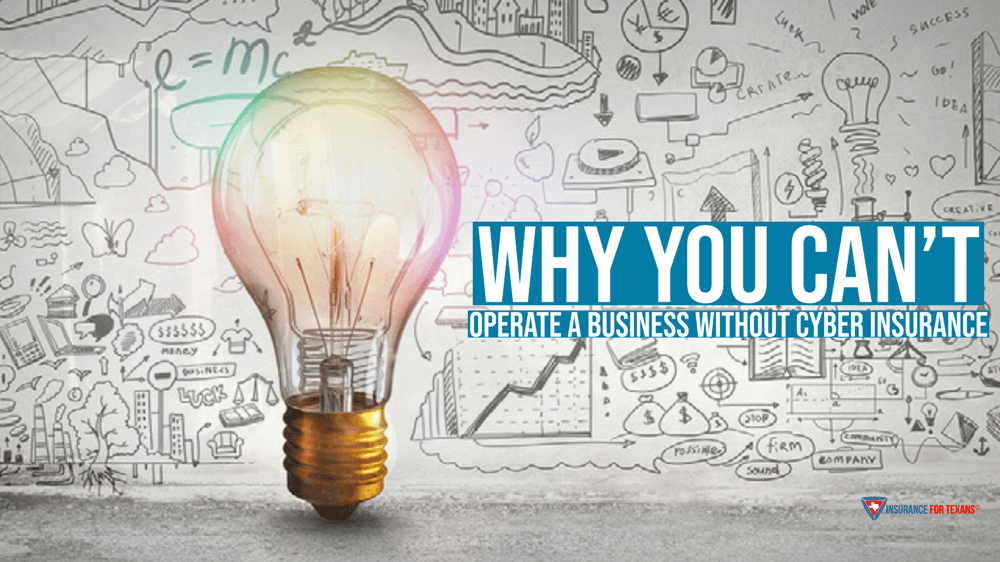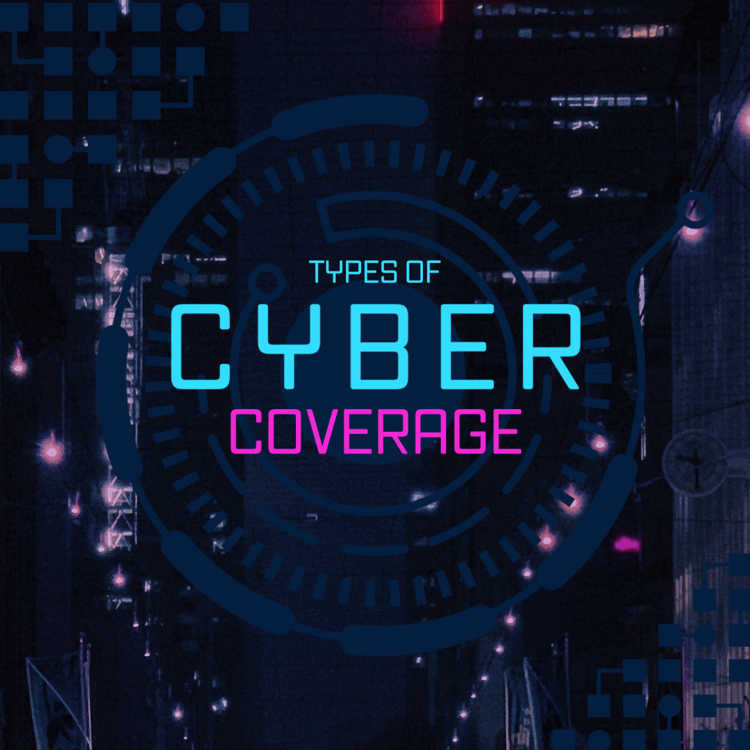If your business is like ours, we communicate constantly via email, chat, text, messenger, and just about anything that is not a phone call. One of the byproducts of this electronic communication is that people put a lot of trust and subsequently information into forms on the internet. And while we all love the convenience of submitting information, we also need to understand it is fraught with peril due to malicious software that is being installed on work computers and servers every day. Let me tell you a story.
At Insurance For Texans, we counsel all business owners to take a Cyber Liability Insurance policy. We work with many insurance companies providing this type of coverage and understand its importance. But not all business owners agree with us. Since we cannot force you to do anything, we simply had one of our longest tenured clients sign an acknowledgement form that we offered coverage and that they declined the cyber coverage.
Fast forward eight months to a frenetic phone call one Tuesday morning. The same customer was very frustrated. They had a series of invoices prepared for a client of theirs that totalled just over $250,000 in revenue to be paid to their business. When our customer reached out, their customer was telling them that they had been paid. But there was no trace of the money anywhere in the system. Upon auditing the email that went to the customer, there was a request to update the payment details when sending in this payment. The routing and account information had been changed to a new bank that was not that of our customer. But the email looked legitimate, and the money was sent. The $250,000 was gone, never to be seen again. Invoice Manipulation is a real thing.
Our client had an unknown breach in their Exchange Email Server and the malware was patiently waiting and watching. When the malware saw the big invoice set to go out, they simply changed the invoice to add in the updated payment information. At that point, the presence of malware necessitated that the business had to be halted, networks shut down, and interrogation of systems performed. While your invoices may not be quite $250,000, losing real revenue and the cost of cleanup could bankrupt your business if you are not prepared. The cost of Cyber Insurance doesn't seem quite so high when you consider this alternative. And it's a very real threat to Texas businesses both big and small.

What is Cyber Insurance?
In today's increasingly digital world, businesses face a growing threat from cyber attacks and data breaches. These incidents can result in significant financial losses, reputational damage, and even legal liability. To mitigate these risks, many companies are turning to cyber insurance. Cyber insurance is a type of coverage that specifically protects businesses from the financial impacts of cyber incidents. It helps businesses recover from various cyber risks, including data breaches, ransomware attacks, and other cyber-related incidents. This article will delve deeper into the importance of cyber insurance and why businesses in Texas should consider getting coverage. By understanding what cyber insurance is and its benefits, businesses can make informed decisions regarding their cybersecurity and risk management strategies. Let's explore further why businesses need cyber insurance in today's digital landscape.
Benefits of Having Cyber Insurance
In today's digital world, cyber attacks and data breaches have become increasingly common, posing significant risks to businesses of all sizes. As a Texas business owner, you need to ask yourself if you are adequately prepared to face these cyber threats. This is where cyber insurance comes into play.
Cyber insurance policies offer numerous benefits that can help businesses recover from cyberattacks and minimize financial losses. First and foremost, having cyber insurance provides financial protection in the event of a data breach or cyber incident. The costs associated with data breaches, including forensic investigations, customer notifications, credit monitoring services, and potential legal actions, can be overwhelming. Cyber insurance coverage can help cover these expenses, ensuring that your business can quickly bounce back from a cyber event.
Moreover, cyber insurance complements good cyber hygiene practices. It encourages businesses to have robust cybersecurity measures in place, as insurance carriers often require policyholders to demonstrate proactive efforts to protect against cyber threats. This can help reduce the likelihood of experiencing a cyber breach in the first place.
In addition to financial protection, cyber insurance is influential in maintaining a strong brand reputation. An organization's reputation takes time and effort to build, and a cyber attack can quickly tarnish it. Cyber insurance can provide coverage for public relations efforts to manage the brand's reputation and rebuild trust with customers and clients.
Cyber insurance policies can also provide coverage for business interruption losses resulting from cyber events. This can be especially critical if your business relies heavily on technology and digital operations. Coverage for defense costs arising from regulatory proceedings related to a cyber incident is another advantage of cyber insurance.
Cyber insurance is more than just an additional expense; it is an essential tool in mitigating the financial risks associated with cybercrime. It helps businesses recover from cyber attacks, minimize financial losses, and maintain a strong brand reputation. It is a crucial component of any comprehensive risk management strategy in today's cyber-threat landscape.

Types of Cyber Insurance Coverage
When it comes to protecting your business from cyber risks, having the right insurance coverage is essential. Cyber insurance policies offer various types of coverage that can help safeguard your business from the financial implications of cyber incidents. From covering the costs of data breaches to providing support for public relations efforts, cyber insurance ensures that your business is prepared to handle the increasing threat of cyber attacks. By understanding the various aspects of cyber insurance, you can make informed decisions to protect your business against the ever-evolving cyber threats.
Data Breach Insurance
Data Breach Insurance, also known as cyber liability insurance, is a specialized type of coverage that helps businesses protect themselves against the financial consequences of cyber attacks and data breaches.
Cyber attacks can result in significant financial losses for businesses, not only due to theft of sensitive information such as personally identifiable information (PII) and personal health information (PHI), but also due to legal expenses, regulatory fines, customer notifications, and public relations efforts. Without the proper coverage, businesses may struggle to recover from the financial repercussions of a data breach.
Data Breach Insurance provides coverage for various scenarios, including network hacking, ransomware attacks, employee negligence, and other cyber incidents. It helps businesses mitigate the risks associated with cyber threats and provides financial protection in the event of a breach.
By obtaining Data Breach Insurance, businesses can better protect their assets, reputation, and customers from the potential financial ruin that may result from cyber attacks. With the increasing frequency and sophistication of cyber threats, having the right insurance coverage is essential for businesses of all sizes.
Network Security and Privacy Liability Insurance
Network Security and Privacy Liability Insurance is a crucial form of protection for businesses that protects businesses from financial losses that result from incidents like system hacking and cyber extortion payments. Cyber attacks, such as data breaches and system hacking, are largely looking at piercing your network security in some form. This will result in stolen customer data, legal expenses, regulatory fines, customer notifications, and damage to a company's reputation. Network Security and Privacy Liability Insurance helps mitigate these risks by providing financial protection in the event of a cyber incident.
Network Security and Privacy Liability Insurance is a vital form of cyber insurance coverage that protects businesses against financial losses caused by incidents like system hacking, DoS attacks, and ransomware extortion payments. With the increasing prevalence of cyber attacks, businesses that handle customer data or store information online should prioritize obtaining this coverage to safeguard their financial well-being.
Business Interruption & System Damage Coverage
Business Interruption & System Damage coverage is an essential component of cyber insurance policies. This coverage protects businesses against financial losses and damages caused by cyber attacks that result in business interruption or damage to computer systems.
In the event of an attack, business interruption coverage provides compensation for lost income and extra expenses incurred during the downtime. This can include loss of revenue from being unable to conduct normal operations, costs of relocating to a temporary location, and expenses associated with restoring systems to full functionality.
System damage coverage, on the other hand, safeguards businesses against the costs of repairing or replacing computer systems and data that have been damaged or destroyed as a result of a cyber attack. This can include the cost of hardware replacement, software recovery, and data restoration.
Having Business Interruption & System Damage coverage is crucial for businesses as it protects them from the significant financial impacts of cyber attacks. These attacks can disrupt operations, causing lost income and incurring expenses for system recovery and repairs. With this coverage in place, businesses can recover more quickly and minimize the financial strain associated with cyber incidents.
Regulatory Proceedings & Defense Costs Coverage
One of the key benefits of cyber insurance is the regulatory proceedings and defense costs coverage it provides. This coverage plays a crucial role in protecting businesses facing legal actions and regulatory penalties related to cyber incidents.
Businesses are required to comply with various laws and regulations when it comes to data protection and cybersecurity. Failure to meet these regulations can result in severe consequences, including costly fines and legal proceedings. Cyber insurance providers help mitigate these risks by covering the legal expenses and defense costs associated with regulatory proceedings.
When a business faces legal action or regulatory penalties due to a cyber incident, cyber insurance companies can provide coverage for legal defense costs. These costs may include fees for hiring attorneys, expert witnesses, and other legal professionals. Additionally, cyber insurance policies often cover expenses related to conducting investigations, audits, and complying with regulatory requirements.
Having regulatory proceedings and defense costs coverage through cyber insurance not only provides financial protection but also ensures that businesses have the necessary resources to mount a strong defense. In the face of a cyber incident, this coverage can be invaluable in helping businesses navigate the legal complexities and potentially avoid significant financial losses.
Common Cyber Risks Covered by Insurers
With evolving technologies and sophisticated cybercriminals, traditional commercial property insurance policies likely will not adequately cover the financial losses and legal liabilities associated with these risks. This is where cybersecurity insurance comes into play. Cyber insurance policies specifically address the unique challenges of the digital world, providing protection against various cyber incidents. Let's explore the common cyber risks that are covered by insurers, explaining why businesses in Texas need to have robust cyber insurance coverage in place to safeguard their operations and reputation.
Malware, Virus and Ransomware Attacks
Malware, virus, and ransomware threats have evolved to target various devices, including Mac, Linux, and mobile devices. It is crucial for businesses to understand the importance of protecting their systems and data from these evolving threats.
One of the most effective ways to mitigate the risk of malware, viruses, and ransomware attacks is by using endpoint protection software. This software provides a robust defense system, continuously monitoring and detecting any potential threats that could infiltrate your network or devices.
In addition to using advanced software, implementing security policies is equally important. This entails creating guidelines and protocols that employees must follow to ensure the security of the company's data and systems. Regularly updating software, using strong passwords, and restricting access to sensitive information are just a few examples of security policies that can help prevent cyber attacks.
While taking these measures can significantly reduce the risk of attacks, it is important to remember that no security system is completely foolproof. Cyber criminals are constantly finding new ways to exploit vulnerabilities in technology. That's where cyber liability insurance comes in.
Cyber liability insurance helps businesses recover from the financial impact of a cyber event by covering costs such as customer notifications, public relations, and even legal expenses.Implementing endpoint protection software and security policies are essential steps in mitigating the risk. However, cyber liability insurance provides an added layer of protection, ensuring that your business can recover financially in the event of a cyber attack.
Phishing Scams and Hacking Attempts
Phishing scams and hacking attempts are two common methods cyber criminals use to launch cyber attacks on businesses. Phishing scams involve fraudulent emails, messages, or websites designed to deceive individuals into sharing sensitive information such as passwords, credit card details, or login credentials. These scams often impersonate reputable organizations, such as banks or government agencies, and can lead to financial losses and identity theft.
Hacking attempts, on the other hand, involve unauthorized access to a company's network or systems. Hackers use various techniques to exploit vulnerabilities in technology, gaining access to sensitive data or causing disruption to business operations. This can result in significant financial and reputational damage.
Implementing robust cybersecurity measures, such as endpoint protection software and security policies, is essential. However, these measures alone may not be enough to prevent all cyber attacks. Cyber liability insurance provides financial protection in the event of a cyber attack helping businesses recover from the financial impact of phishing scams, hacking attempts, and other cyber attacks, providing peace of mind and ensuring the continuity of operations.
Denial of Service (DoS) Attacks
Denial of Service (DoS) attacks are a type of cyber attack that aims to overwhelm a company's network or systems, rendering them unable to function properly. These attacks flood the targeted network with an overwhelming amount of traffic, causing it to slow down or crash entirely.
The consequences of a successful DoS attack can be severe for businesses. They may experience prolonged periods of downtime, leading to disrupted operations and loss of productivity. This can result in financial losses and damage to the company's reputation. Additionally, customer trust and loyalty may be compromised if they are unable to access the company's services or experience extended delays.
To prevent and mitigate the impact of DoS attacks, businesses can implement several measures. Network monitoring tools can help identify unusual traffic patterns and detect potential attacks in real-time. Traffic filtering can be used to block malicious traffic and prevent it from reaching the network. Load balancing can distribute incoming traffic across multiple servers, preventing a single server from becoming overwhelmed.
Despite these preventative measures, it is important for businesses to have cyber liability insurance in place to provide coverage for financial losses incurred due to a DoS attack, including expenses for system restoration, loss of income during downtime, customer notifications, and public relations efforts. Having this type of insurance ensures that businesses have the necessary resources to recover and continue their operations in the event of a DoS attack.
Data Loss or Theft from Mobile Devices or Cloud Storage Platforms
Data loss or theft from mobile devices and cloud storage platforms can have significant consequences for businesses. With the increasing reliance on mobile devices for work purposes and the widespread use of cloud storage for data storage and accessibility, the risk of data breaches and cyber attacks has become even more pronounced.
Mobile devices such as smartphones and tablets are susceptible to loss or theft, and if sensitive business data is stored on these devices, it can fall into the wrong hands. Similarly, cloud storage platforms, while convenient for storing and accessing data, can also be targeted by cyber criminals, resulting in data breaches and potential loss or theft of valuable information.
The potential consequences of data loss or theft from mobile devices or cloud storage platforms can be significant. Not only can it lead to financial losses due to disrupted operations and loss of productivity, but it can also damage a company's reputation and result in the loss of customer trust. Cyber insurance provides an added layer of protection, helping businesses mitigate the financial impact of data breaches and ensuring they have the necessary resources to recover and continue their operations.

Who Should Consider Buying Cyber Insurance?
Cyber insurance is becoming increasingly critical for Texas businesses. With the rising frequency and sophistication of cyber attacks, all businesses must consider purchasing cyber insurance to protect their assets and mitigate the financial risks associated with cyber incidents. Here are five specific business types that we specifically help obtain Cyber Protection through insurance.
1. Small and Medium-sized Businesses (SMBs):
SMBs are often targeted by cyber criminals due to their limited cybersecurity measures. A cyber insurance policy can offer financial protection for potential financial losses resulting from cyber attacks.
2. Businesses That Handle Sensitive Customer Data:
Companies that handle sensitive customer information, such as credit card details or personal health records, are at a higher risk of data breaches. Cyber insurance can provide coverage for the costs associated with investigating the breach, notifying affected customers, and any legal liabilities that may arise.
3. Businesses That Rely On Technology:
Any business that heavily relies on technology, such as online retailers or tech companies, should have cyber insurance. It can help cover the costs of business interruption, data loss, and reputational damage in the event of a cyber attack.
4. Businesses With High Annual Revenue:
Large businesses with substantial annual revenue are attractive targets for cyber criminals. Cyber insurance can provide the necessary financial resources to recover from a cyber event and minimize the impact on the company's bottom line.
5. Businesses In Regulated Industries:
Industries such as healthcare, finance, and legal services are subject to specific data protection regulations. Cyber insurance can help these businesses comply with notification requirements and protect them from financial penalties in case of a data breach.
How Can I Get Cyber insurance Coverage?
Cyber attacks can have severe consequences for any business. Much like it did for our manufacturing customer. Even if you don't handle sensitive data, you still rely on technology and digital systems for day-to-day operations. A cyber attack can disrupt your business, lead to data loss, and cause reputational damage. These consequences can result in financial losses, such as loss of revenue and customer trust.
The first step in obtaining Cyber Coverage is to have a comprehensive audit done on your website and systems. Insurance For Texans helps provide this audit to you free of charge so that you can have a better understanding of what you have at risk. These results also help our agents present a comprehensive view of your business to the various insurance companies that we partner with to provide you the best protection. When we can present a clear view of your needs, it keeps your cyber insurance costs as low as possible.
Click the image below to get started with your audit and putting proper protection in place through our professional services.




